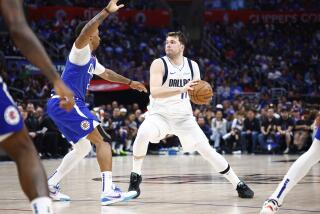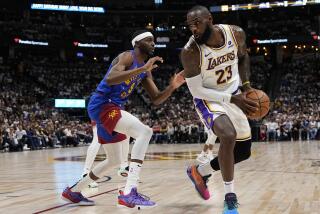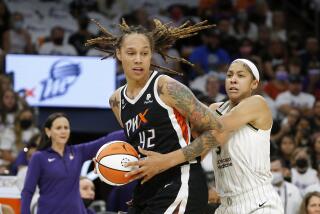NBA Dispute Will Sideline Marketers Too
- Share via
The NBA’s record run of 35,001 straight games over the last 51 seasons isn’t the only thing being lost because of the ongoing labor dispute that on Tuesday bounced over into the regular season.
With the first two weeks of the season now canceled, National Basketball Assn. fans will not only see fewer games, they’ll also see less NBA-licensed merchandise on store shelves during the holiday shopping season because buyers for retail chains have cut orders for the league’s licensed apparel. Some NBA sponsors that had planned to use the league and its players in product promotions early in the new season are scrambling to find Plan B.
And while the NBA’s woes might seem to be good news for other professional sports leagues, that is not the case.
“When we were on the other side, I never felt that trouble in hockey, football or baseball helped us,” said Rick Welts, president of NBA Properties. “The [sports marketing] industry as a whole always suffers when one sport is in this situation. I think it makes professional sports less dependable to retailers and licensees.”
NBA executives and coaching staffs will cobble together playbooks once labor issues separating owners and players are bridged. But it could be more difficult for the NBA to restore normal relations with partners in off-the-court business ventures.
Retailers have been struggling for months to adjust their orders in the $3-billion business of selling licensed NBA merchandise.
“The lockout makes it easy for apparel buyers at stores because they simply don’t buy NBA apparel,” said John Horan, editor of Sporting Goods Intelligence, a Glen Mills, Pa.-based newsletter. “Leagues know there’s a very predictable phenomenon that occurs when they stop playing--they hurt merchandise sales big-time, because if you’re not on TV, you’re not getting any exposure.”
The long-rumored work stoppage also has frustrated executives at companies that produce licensed NBA merchandise or rely heavily on professional leagues to sell sports apparel and shoes.
“On the best days, you’re blindly optimistic that it will end quickly,” said Steven Raab, vice president of marketing at Starter Corp., which manufactures NBA-licensed apparel. “But the reality is you end up pushing promotions back, some retailers will cancel orders and you’re going to lose something.”
“The effect on Nike has been minimal so far,” said Vizhier Corpuz Mooney, spokeswoman for Nike Inc., which outfits 10 basketball teams and provides shoes to 65% of the NBA’s players. “And it’s going to be very difficult to predict the ultimate impact until we’re certain whether or not we’ll have a season.”
Nike “still plans to promote the game of basketball, and we still plan to release apparel and footwear to the retail level as planned,” Mooney said. “At this point in time, it would be unwise and inaccurate to try and predict the impact on Nike at the retail sales floor.”
The work stoppage also raises issues for corporate sponsors that have paid millions of dollars to the NBA for the right to use the league in their marketing campaigns.
Welts of NBA Properties says the NBA’s corporate sponsors are standing behind the league.
“Companies that use the NBA to help sell their own products have been terrific,” Welts said. “Some of those companies have had to make adjustments . . . but these companies want us to emerge from this as a business partner who will be with them for the long term.”
But that doesn’t mean companies like long-distance provider AT&T; Corp. aren’t reviewing their advertising and marketing budgets.
While AT&T; has sponsored a million-dollar three-point shot contest in conjunction with the NBA, AT&T; spokesman Burke Stinson said the company’s involvement in future contests will be driven in part by “whether this [NBA] decision leaves a bitter taste in fans’ mouths. AT&T; certainly has many options as to where it spends its advertising and marketing budget.”
And as fans grumble about yet another sports season being held hostage by franchise owners and athletes, industry marketing observers are pointing to the wreckage of the strike-shortened 1994 Major League Baseball season for possible clues to the NBA’s future.
After alienating fans by halting the season at the All-Star break, professional baseball struggled to regain the confidence of jaded fans.
Whether the NBA can bounce back quickly after its first regular season work stoppage is “difficult to say,” said Jeffrey Sacks, editor of Team Licensing Business, a Phoenix-based newsletter.
“Baseball was having a good season in 1994 . . . while the NBA was going to have a tough year anyway, what with the [reigning NBA champion Chicago] Bulls being broken up and Michael Jordan apparently retired.”
* MAIN STORY
The NBA canceled the first two weeks of the season. A1
More to Read
Go beyond the scoreboard
Get the latest on L.A.'s teams in the daily Sports Report newsletter.
You may occasionally receive promotional content from the Los Angeles Times.










